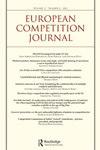Exclusionary innovation in the European Commission’s decisions against Google
Q2 Social Sciences
引用次数: 0
Abstract
ABSTRACT Exclusionary innovation poses a bigger threat to competition in digital platform markets than in other innovation markets given the relevance of data-driven network effects as well as the strong incentive and ability of digital platforms to pursue an envelopment strategy. This paper advocates a theory of harm called “platform-wide exclusionary innovation” which applies to conduct that plausibly creates short-term consumer benefit but is more likely to foreclose rivals and therefore reduce technological progress in the long run. This theory of harm can help to explain Google’s conduct that the European Commission condemned in its three decisions against Google between 2017 and 2019. Due to interconnections between Google’s practices in the three cases this article assesses whether they may be considered jointly for the purpose of finding of an infringement of Article 102 TFEU or under the proposed Digital Markets Act.欧盟委员会反对b谷歌的决定中的排他性创新
鉴于数据驱动的网络效应的相关性以及数字平台追求包络战略的强烈动机和能力,排他性创新对数字平台市场的竞争构成了比其他创新市场更大的威胁。本文提倡一种被称为“全平台排他性创新”的危害理论,该理论适用于那些看似能给消费者带来短期利益,但更有可能使竞争对手丧失竞争资格,从而在长期内阻碍技术进步的行为。这种伤害理论可以帮助解释欧盟委员会在2017年至2019年期间对谷歌的三次决定中谴责的谷歌的行为。由于b谷歌在这三个案例中的做法之间存在相互联系,本文评估了是否可以将它们联合考虑,以发现违反TFEU第102条或拟议的《数字市场法》。
本文章由计算机程序翻译,如有差异,请以英文原文为准。
求助全文
约1分钟内获得全文
求助全文
来源期刊

European Competition Journal
Social Sciences-Law
CiteScore
1.50
自引率
0.00%
发文量
12
期刊介绍:
The European Competition Journal publishes outstanding scholarly articles relating to European competition law and economics. Its mission is to help foster learning and debate about how European competition law and policy can continue to develop in an economically rational way. Articles published in the Journal are subject to rigorous peer review by leading experts from around Europe. Topics include: -Vertical and Conglomerate Mergers -Enlargement of the Union - the ramifications for Competition Policy -Unilateral and Coordinated Effects in Merger Control -Modernisation of European Competition law -Cartels and Leniency.
 求助内容:
求助内容: 应助结果提醒方式:
应助结果提醒方式:


